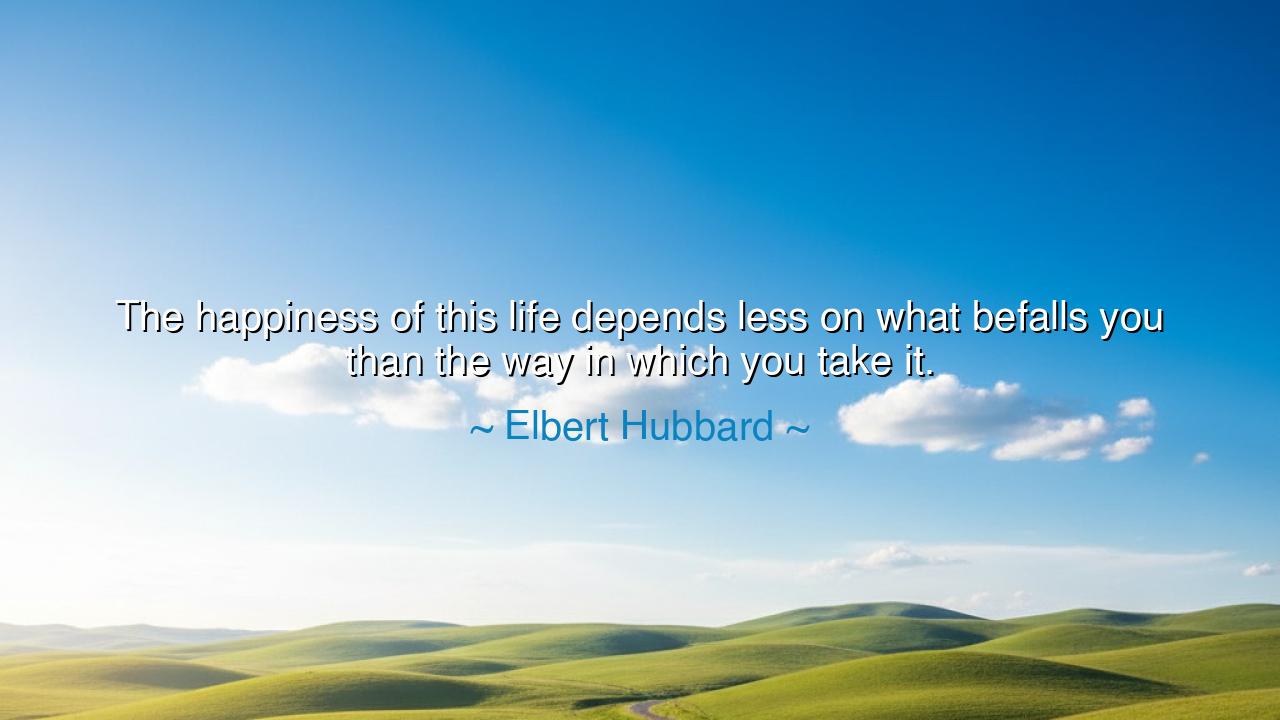
The happiness of this life depends less on what befalls you than
The happiness of this life depends less on what befalls you than the way in which you take it.






Hear the wisdom of Elbert Hubbard, a craftsman of words and of life, who declared: “The happiness of this life depends less on what befalls you than the way in which you take it.” In these few lines lies a truth as eternal as the sunrise — that joy and sorrow are not the gifts or curses of fate, but the creations of the human spirit. For though the winds of circumstance may batter the body, it is the mind that determines whether one bends or breaks. Happiness, says Hubbard, is not the result of events, but the art of response. It is not found in what happens to us, but in what we make of what happens.
The origin of this saying rises from the heart of the American Arts and Crafts movement, where Elbert Hubbard, a philosopher, artisan, and publisher, labored not only with his hands but with his spirit. Born in the late 19th century, he lived through storms of change — industrial revolutions, wars, and social upheavals. Yet, amid such turmoil, he taught that meaning and contentment come not from comfort, but from perspective. In his writings, he often urged people to cultivate inner strength — to meet life’s challenges with grace, humor, and will. This quote, then, is both his creed and his challenge to humanity: to master the art of endurance, to transform adversity into wisdom.
In the manner of the ancients, Hubbard’s truth reflects the teachings of the Stoics — those philosophers who walked in the marble colonnades of Rome and Athens, unshaken by fortune’s fickle turns. Epictetus, born a slave, taught that no man can control the world, but all can control their own attitude. Marcus Aurelius, emperor of the mightiest realm on earth, echoed the same: “You have power over your mind — not outside events. Realize this, and you will find strength.” Thus, Hubbard, centuries later, gave voice once again to this eternal wisdom: that the heart’s freedom depends not upon destiny, but upon discipline.
Consider the story of Helen Keller, blind and deaf from infancy, yet radiant with joy and purpose. If ever a soul was tested by fate, it was hers. But she chose not to be defined by loss. Through patience and fierce will, she learned to speak, to read, to write — to live. Her life was proof that happiness is born not from what one has been given, but from what one chooses to make of it. “Keep your face to the sunshine,” she said, “and you cannot see the shadow.” Such a life stands as living testament to Hubbard’s words — that the way we take what befalls us determines whether we live in bitterness or in beauty.
Yet how many today forget this truth! How many curse the storm instead of learning to sail through it? They wait for the world to grow kinder, for fortune to turn, for peace to arrive from without. But happiness does not come as a gift wrapped in chance — it is forged in the furnace of attitude. The one who faces hardship with resentment becomes its prisoner; the one who meets it with acceptance becomes its master. The mind, when ruled by gratitude, can make even poverty rich; but when ruled by complaint, it can turn even abundance into misery.
To “take” life rightly, as Hubbard commands, is to practice the art of inner stillness. It is to rise each morning not asking, “What will the world give me?” but rather, “What will I bring to the world?” It is to greet both blessing and burden with the same calm eyes, to find lesson in struggle, and to refuse despair its victory. This is no easy path — it demands courage, humility, and patience — but it is the only path that leads to lasting peace. For even the gods, it is said, admire the mortal who accepts fate without surrendering dignity.
So let this be your lesson, O seeker of wisdom: happiness is not a place you find, but a way you walk. Do not wait for perfect days, for they are few; instead, perfect your response to imperfect ones. When pain comes, meet it with endurance. When loss comes, meet it with gratitude for what remains. When joy comes, savor it deeply, but without clutching — for all things pass, and peace comes only to those who accept this truth.
Thus, the teaching of Elbert Hubbard stands like a torch for every generation: Life will test you, but it cannot define you. Only your heart can do that. Cultivate a spirit that turns every misfortune into strength, every sorrow into wisdom, every day into opportunity. And when the storms of fate descend, as they surely will, stand firm in this knowing — that happiness is not in what befalls you, but in how you take it, with courage, humility, and a heart unbroken by the tempests of the world.






AAdministratorAdministrator
Welcome, honored guests. Please leave a comment, we will respond soon